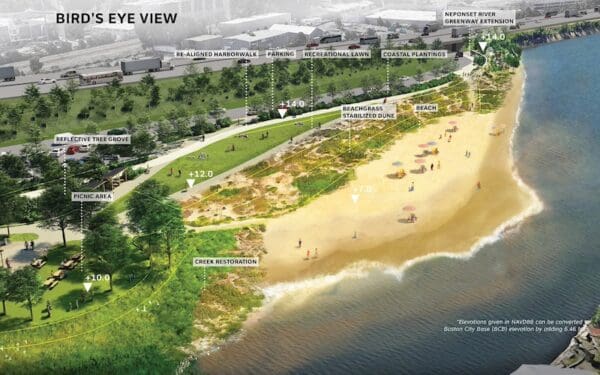
As we continue to reckon with systemic racism in the United States, we must root out the quiet and insidious ways governments and decision-makers sustain racist policies. Photo: Mike Steinhoff (Creative Commons)
When it comes to investment in transportation infrastructure in this country, communities of color and low-income communities have been overburdened and underserved for decades. Transit policy and planning decisions between the 1950s and 1970s were particularly harmful. The build-out of our national highway system divided neighborhoods and displaced Black, Brown, and low-income communities. It also left these same communities bearing the brunt of air pollution from increasingly vehicle-clogged roadways.
Meanwhile, those same policy and planning decisions benefitted wealthier and whiter neighborhoods. Those communities gained both better public transit service and access to high-speed travel on the country’s new interstate system.
Decades later, that legacy of racism in transportation planning never really went away. We saw it earlier this summer when a majority-white regional planning organization approved a five-year budget that shortchanges communities of color and low-income communities in Greater Boston. As a result, the already enormous gap in transportation investment between these communities and their wealthier, whiter neighbors will only grow wider.
As we continue to reckon with systemic racism in the United States, we must root out the quiet and insidious ways governments and decision-makers sustain racist policies. The funding gap above is a textbook example. Here are the lessons to be learned from it.
What’s the Problem?
For decades, communities of color throughout Greater Boston have borne the higher burdens of living next to highways and with congested roadways dividing neighborhoods. They’ve also dealt with the additional noise and air pollution that comes with living near active marine ports and Logan Airport.
At the same time, these communities have less access to the benefits of affordable, reliable, pollution-free transportation options.
The policy decisions that led to such inequities were often deliberate and rooted in systemic racism. To right the wrongs of this transportation racism over the last century, we should invest more in communities of color today, not less.
Instead, last June, the Boston Metropolitan Planning Organization (MPO) approved a five-year budget that earmarks a smaller share of funding – just 21% – to areas considered “Minority Population.” The MPO Board made this decision despite those communities making up 28% of the region that the MPO serves.
Ultimately, though, it’s not just the board’s approval of this lopsided budget that’s a problem. It’s the make-up of the board itself. Nearly all of the MPO’s 22 board members appear to be white. What’s more, board members are not required to ride public transit regularly.
That means the people who make critical funding decisions for our communities do not fully represent the diversity or interests of the people they are charged with serving.
What’s at Stake?
Continuing to widen the gap in investment between wealthier and lower-income communities will only entrench current inequities. The latter will find themselves exposed to more toxic pollution and the health impacts – like asthma and other respiratory diseases – that come with it. And the former will benefit once again from better transit service.
Most of the transportation investments the MPO recently dedicated to so-called “minority populations” will ultimately improve air quality and transportation options for residents. Investment in bus routes, train service, and bike paths get people out of cars, resulting in less pollution and less traffic. However, those gains are marginal compared to what more equitable funding could accomplish. Instead, a disproportionate majority of the MPO’s budget over the next five years will go to wealthier communities whose air is already much cleaner.
In the end, it’s all relative. The Boston MPO’s budget means everyone will get cleaner air. But that doesn’t change the fact that they have just dedicated more of the limited resources to the communities that need them least.
What’s the Solution?
Representation matters. To best represent the interests of transit riders and the communities it serves, the Boston MPO should reflect the diversity of those communities. Currently, it does not.
We have an opportunity to change that right now. Of the Board’s 22 members, 12 are elected municipal officials from cities or towns the MPO represents. Each fall, 4 of those 12 seats open to nominations for a three-year term. It is crucial that at least one of the new board members lives in a state-designated environmental justice population, depends on public transportation, or identifies as a person of color or low-income resident.
Want to Help?
Elected officials for the cities and towns in the MPO region play a role in determining the composition of those four open seats. If you live in one of the region’s 97 cities and towns, please contact your city or town mayor, manager, or administrator before October 1. Ask them to advocate for more diverse representation on the MPO Board. The election for the new board members will be finalized on October 27.
You can also help if you live in one of the cities currently represented on the Board: Boston, Brookline, Newton, Arlington, Somerville, Everett, Beverly, Woburn, Acton, Framingham, Medway, Norwood, and Rockland. Contact your city leader and tell them you want to see an MPO that reflects the diversity and interests of the entire region.
Transportation racism has a long and entrenched history in our country. Rooting it out means calling it out when we see it. Together, we can create a more just and equitable transportation system for all.
You can find contact information for your mayor, manager, or administrator on your city or town website here.



